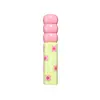DHC Lip Cream Versus COLORGRAM Fruity Glass Tint
What's inside
What's inside
 Key Ingredients
Key Ingredients

 Benefits
Benefits

 Concerns
Concerns

 Ingredients Side-by-side
Ingredients Side-by-side

Lanolin Oil
EmollientCaprylic/Capric Triglyceride
MaskingEuphorbia Cerifera Wax
Beeswax
Emulsion StabilisingLanolin
EmollientStearic Acid
CleansingSqualane
EmollientParaffin
PerfumingOlea Europaea Fruit Oil
MaskingPentylene Glycol
Skin ConditioningTocopherol
AntioxidantPhenoxyethanol
PreservativeStearyl Glycyrrhetinate
Skin ConditioningPanax Ginseng Root Extract
EmollientAloe Barbadensis Leaf Extract
EmollientWater
Skin ConditioningBis-Diglyceryl Polyacyladipate-2
EmollientDiisostearyl Malate
EmollientDiphenyl Dimethicone
EmollientOctyldodecanol
EmollientGlycerin
HumectantCetyl PEG/PPG-10/1 Dimethicone
EmulsifyingDipropylene Glycol
HumectantEthylcellulose
Sorbitan Isostearate
EmulsifyingPentylene Glycol
Skin ConditioningHydroxyethyl Acrylate/Sodium Acryloyldimethyl Taurate Copolymer
Emulsion StabilisingSqualane
EmollientCeteareth-20
CleansingSodium Stearoyl Glutamate
CleansingAlcohol Denat.
AntimicrobialTitanium Dioxide
Cosmetic ColorantPhenoxyethanol
PreservativePolysorbate 60
EmulsifyingParfum
MaskingGlyceryl Caprylate
EmollientCI 15985
Cosmetic ColorantAcid Red 33
CI 19140
Cosmetic ColorantEthylhexylglycerin
Skin ConditioningCI 45410
Cosmetic ColorantAluminum Hydroxide
EmollientAmmonium Polyacrylate
StabilisingButylene Glycol
HumectantPentaerythrityl Tetra-Di-T-Butyl Hydroxyhydrocinnamate
AntioxidantWater, Bis-Diglyceryl Polyacyladipate-2, Diisostearyl Malate, Diphenyl Dimethicone, Octyldodecanol, Glycerin, Cetyl PEG/PPG-10/1 Dimethicone, Dipropylene Glycol, Ethylcellulose, Sorbitan Isostearate, Pentylene Glycol, Hydroxyethyl Acrylate/Sodium Acryloyldimethyl Taurate Copolymer, Squalane, Ceteareth-20, Sodium Stearoyl Glutamate, Alcohol Denat., Titanium Dioxide, Phenoxyethanol, Polysorbate 60, Parfum, Glyceryl Caprylate, CI 15985, Acid Red 33, CI 19140, Ethylhexylglycerin, CI 45410, Aluminum Hydroxide, Ammonium Polyacrylate, Butylene Glycol, Pentaerythrityl Tetra-Di-T-Butyl Hydroxyhydrocinnamate
 Reviews
Reviews

Ingredients Explained
These ingredients are found in both products.
Ingredients higher up in an ingredient list are typically present in a larger amount.
Pentylene glycol is typically used within a product to thicken it. It also adds a smooth, soft, and moisturizing feel to the product. It is naturally found in plants such as sugar beets.
The hydrophilic trait of Pentylene Glycol makes it a humectant. As a humectant, Pentylene Glycol helps draw moisture from the air to your skin. This can help keep your skin hydrated.
This property also makes Pentylene Glycol a great texture enhancer. It can also help thicken or stabilize a product.
Pentylene Glycol also acts as a mild preservative and helps to keep a product microbe-free.
Some people may experience mild eye and skin irritation from Pentylene Glycol. We always recommend speaking with a professional about using this ingredient in your routine.
Pentylene Glycol has a low molecular weight and is part of the 1,2-glycol family.
Learn more about Pentylene GlycolPhenoxyethanol is a preservative that has germicide, antimicrobial, and aromatic properties. Studies show that phenoxyethanol can prevent microbial growth. By itself, it has a scent that is similar to that of a rose.
It's often used in formulations along with Caprylyl Glycol to preserve the shelf life of products.
Squalane is an emollient that helps the skin hold onto moisture. It's an oily liquid that occurs naturally in certain types of fish and plant oils.
Because squalane boosts hydration in the skin, it also comes with plenty of benefits: it is an antioxidant and can help fight free radicals and skin damage. Squalane is also found to have a detoxifying effect when applied.
Squalane comes from squalene, which occurs naturally within the sebum of our skin. It is one of the oils our skin produces to keep itself hydrated. Squalane is the hydrogenated version of squalene and has a longer shelf life.
Research shows that squalane is non-irritating (even at 100% concentration).
In general, it's a fantastic ingredient. It does a great job at hydrating the skin, and it's suitable for those with sensitive skin.
The source of squalane may impact malassezia / fungal acne. This is because olive oil derived squalane can contain impurities such as fatty acids and plant waxes. Sugarcane derived squalane is recommended for anyone with malassezia concerns.
Is squalane vegan?
This depends on the source. Squalane can be derived from both plants and animals. Most squalane used in skincare comes from plants.
Please note: the source of squalane is only known if disclosed by the brand. We recommend reaching out to the brand if you have any questions about their squalane.
Read more about squalene with an "e".
Is squalane an oil?
Squalane is often called an oil, but it’s technically not; it’s a hydrocarbon, meaning it’s only made of carbon and hydrogen, unlike true oils which are triglycerides made of fatty acids and glycerol.
The term “oil-free” isn’t regulated, so companies can define it however they want. Some exclude all oils, while others just avoid mineral oil or comedogenic oils.
While some people avoid oils thinking they cause breakouts, the right kind of oil (or oil-like ingredient like squalane) can actually help balance and hydrate your skin. It’s worth testing out simple oils or squalane to see what works best for your skin.
Learn more about Squalane